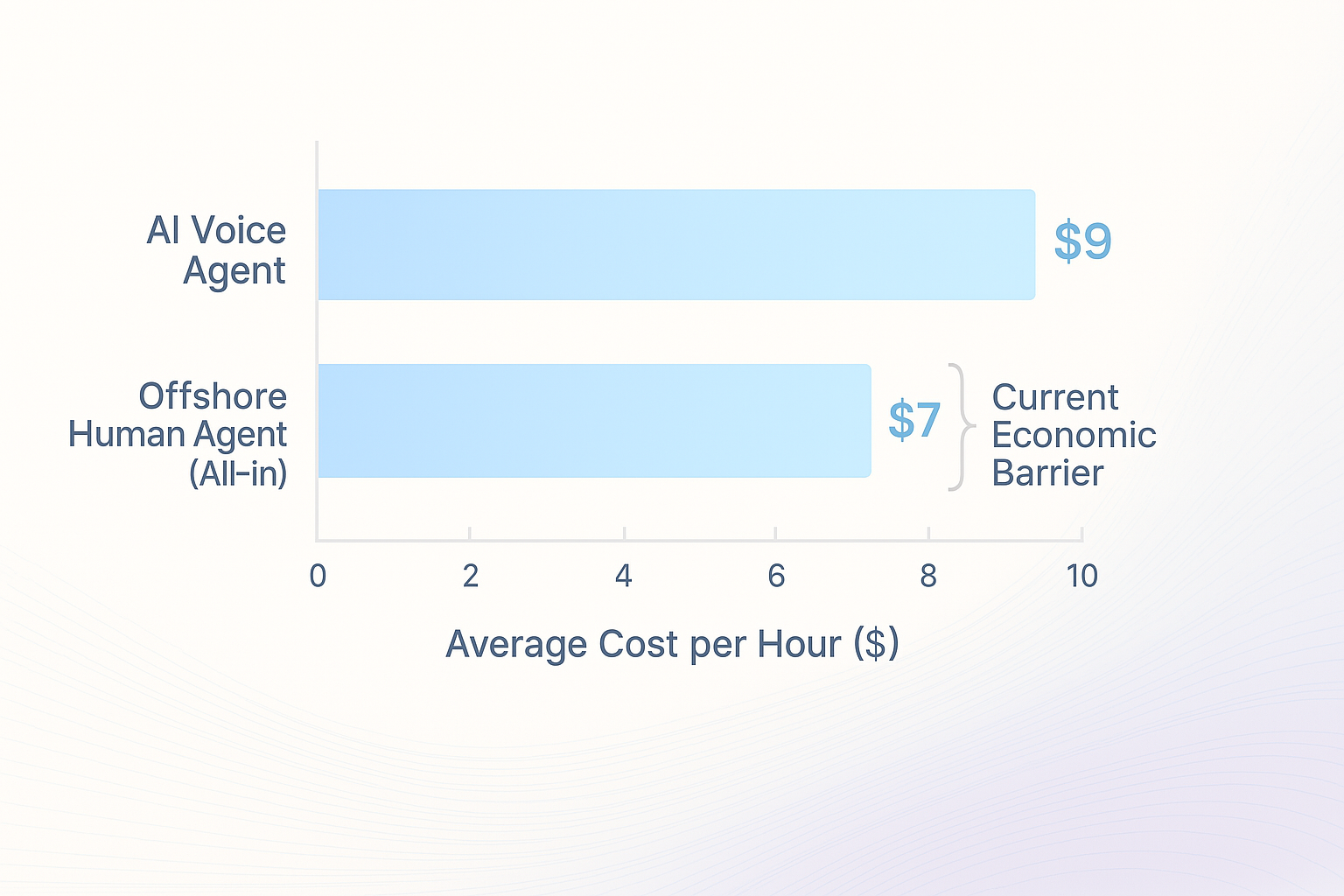The Voice AI Market Opportunity
When I was starting Prim AI, Dave Blundin told me that the voice AI industry was a $10 trillion market whose fate would be determined in the next couple of years. There are super impressive companies like Pipecat (Daily.co), Livekit, Vapi AI, Retell AI, Vogent AI, ElevenLabs, and more working on this problem. Why hasn't it taken over yet? Months later, I finally figured it out.
The Economics Barrier
It's simple economics.

Currently, most voice agent solutions operate in the $6-$12 per hour range. At first glance, this might not seem like much, but offshore call center workers typically cost businesses around $2-$4 an hour for labor and land at $6-$8 an hour all in. These human agents are still more economical than AI counterparts. Because of this, AI Voice agents have only found strong footholds in niche scenarios where conversations are scarce, proximate, or require secure handling of sensitive information.
Niche Markets: Scarcity, Proximity, and Security
Scarcity
Take scarcity. AutoAce, for instance, is an AI voice agent platform aimed specifically at automotive service centers. A missed phone call or a delayed response here could mean losing appointments worth hundreds of dollars each. Rather than staffing humans 24/7, a reliable AI ensures calls never go unanswered, effectively boosting revenues without proportionate overhead.
Proximity
Similarly, proximity matters greatly in certain businesses. Presto deploys voice AI at fast-food drive-thrus, creating an on-site, real-time customer interaction experience. The system processes orders, handles complexities like background noise, and even upsells menu items—all crucial tasks that aren't practical to offshore.
Security
Security is another pivotal use case. Posh AI partners with banks, credit unions to offer around-the-clock, secure conversational experiences without exposing sensitive information to external risks. Because compliance and privacy are non-negotiable in these industries, voice AI is uniquely suited to meet these stringent requirements.
Price Points That Will Define the Market
But these niche markets are just the beginning. Real adoption—mainstream, ubiquitous deployment—is waiting on critical breakthroughs in cost efficiency.
The $2/Hour Barrier
The first barrier is the $2/hour threshold. Once AI voice agents can operate at or below this price point, they'll effectively out-compete even the cheapest offshore labor. This flips the economics entirely, unlocking at least a $100 billion market. All companies are currently balancing profit-taking with the market pressure to lower prices. The savviest will realize that dropping down to this threshold will accelerate and open up a large market.
The Revolutionary $0.25/Hour Milestone
Yet, even more exciting is the next milestone—the $0.25/hour mark. At this almost negligible rate, voice agents wouldn't merely replace call center reps; they would infiltrate every conceivable interaction. Imagine every non-player character (NPC) in a video game suddenly becoming conversational, interactive entities. Think of books narrated by AI voices capable of answering questions directly from curious readers. At $0.25/hour, voice interaction becomes as ubiquitous and inexpensive as email—every consumer interaction could potentially become personalized and conversational.
The Imminent Economic Shift
This isn't a distant fantasy. LLM pricing is falling rapidly—by as much as 10x reductions annually. By late 2025 into early 2026, we're expected to hit critical mass with Voice AI. The economics will finally align with technological capabilities, triggering a massive, industry-wide re-platforming.
Conclusion: The Era of Ubiquitous Voice AI
So why hasn't voice AI taken off yet? Because we're still riding the early curve of adoption. The tech is here, the market is vast, and the use cases compelling. But the economics haven't quite hit mainstream viability—yet. The tipping points are clear: $2/hour will revolutionize cost-sensitive industries, and $0.25/hour will democratize conversational AI for everyone, everywhere.
The era of ubiquitous AI voice agents isn't just imminent—it's inevitable. And those who understand and prepare for this economic inflection will lead the charge into a $10 trillion future.